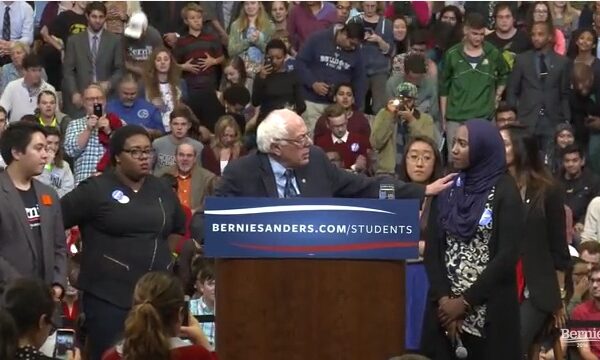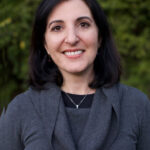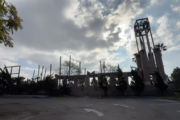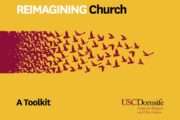Editor’s Note: Rhonda updated this post to reflect the broader trends of the election.
A coalition of Muslim, Black and Latino activists recently shut down a rally for presidential contender Donald Trump on the University of Illinois at Chicago campus. The scene of the protests and clashes reminded me of the countless protests I covered as a journalist in the Middle East almost a decade ago. In Syria, a group of activists would gather in front of the court house. Nearby, a group of young men, often paid by the government, would gather to sweep in on the protesters, screaming epithets, shoving and often getting into physical altercations. Eventually, the protest would be dispersed. The anti-democratic forces would have “won.”
In Chicago, it may have looked like the activists were the thugs from the outside. In spirit and in make-up, though, it is the Trump supporters who have been eager to pick the fights, support authoritarian ideas and sideline democratic ideals. And it was the protesters who were trying to say, “We don’t want this type of Islamophobic, anti-immigrant, racist rhetoric here, on our campus, in our community.”
What’s ironic is that presidential candidate Donald Trump may finally be creating a united front in opposition to his Islamophobic, “Islam hates us,” anti-immigrant rhetoric. In the process, the 3.3 million American Muslims may be becoming an electoral voting bloc to be reckoned with, and this year, they are feeling the Bern.
The Muslim population is diverse, made up of not only immigrant Arabs and South Asians, but also of African-Americans, Latinos and native-born Americans. Currently 1 percent of the U.S. population, it is expected to grow to 8.1 million people by 2050, becoming the second largest religious group after Christians. Already, Muslims comprise significantly more than 1 percent of the populations in certain cities, and in some states, such as New Jersey, there are two or three times as many Muslims as the national average.
This last fact may make the Muslim-American vote increasingly important in certain swing states, and a significant force in some blue states. Michigan’s primary, which went to Bernie Sanders, might be a sign of what’s to come. Last week, media pundits marveled at the idea that Dearborn, an area with a large Muslim and Arab-American population, came out in favor of Bernie Sanders. MSNBC’s Lawrence O’Donnell was embarrassingly incredulous that Arab- and Muslim-Americans had voted overwhelmingly for a Jewish candidate.
We don’t know whether Muslims helped tip the vote for Sanders last week in Michigan. What we do know is that we need to start discussing and understanding the American-Muslim communities in ways that go beyond the veil, terrorism and anti-Semitism. It is time we begun to understand what motivates them. On-the-ground reporting in Dearborn could have helped pundits understand the lure of Bernie among American Muslims.
Sanders spoke directly to Muslim and Arab Americans in Michigan. He held town meetings in Dearborn and ran ads in newspapers and on the radio in Arabic geared towards these first-generation Americans. Sanders spoke to the issues facing blue-collar Arab and Muslim populations; he spoke about health care, the loss of jobs, the rising cost of universities and income inequality.
No candidate in our history has courted the Arab or Muslim vote in this way. Hillary Clinton’s campaign stayed clear of the Muslim and Arab communities, choosing instead to talk to the white and black populations in Michigan. Many Muslim Americans don’t trust Clinton. Some still recall how she returned $50,000 in donations from Muslim-American groups during her 2000 Senate campaign.
Although many Muslims remain conservative on social issues, new generations are changing the conversations in their homes. When the Supreme Court came out in favor of gay marriage, for instance, my Muslim friends went rainbow on Facebook. They have caught glimpses of what real hatred and racism looks like. They listen to our politicians say that they should be banned from their own country. They watch people in their neighborhoods don kafir (infidel) t-shirts and baseball caps—periphanelia that was sold at Sears until they was recently pulled—and they’re unsure of why or what that means for them. A video of a veiled woman being followed by men openly carrying guns went viral a few months ago among Muslims. They know they are the new target. Muslims have begun to understand that they must fight for the freedoms of other minorities if they are to gain those same freedoms themselves.
Many Muslims recall how in October, Remaz Abdelgader, a senior at George Washington University, asked Sanders what he planned to do about Islamophbia. He invited Abdelgader on stage and responded with the following: “There is a lot of anger being generated and hatred being generated against Muslims in this country. That is absolutely correct. There is hatred being generated against immigrants in this country. And if we stand for anything we have got to stand together and end all forms of racism….” Then he gave her a hug. That video went viral.
Sanders, as the son of Jewish immigrants, may be the best candidate to understand American Muslims these days. When he talked about being proud of his heritage, many Muslims somehow also felt proud. Here is a Jewish man who not only was proud of who he was and where he came from, but also stood up for the “other.” Many Muslims can relate to Sanders’ immigrant story. They seem to be relating to his compassion and message that as Americans, we are all in this together.
And, most of all, Bernie’s campaign may be the one that makes Muslim Americans feel like they’re finally part of the process.
Rhonda Roumani is a contributing fellow with the USC Center for Religion and Civic Culture and a journalist fellow with the Spiritual Exemplars Project.






